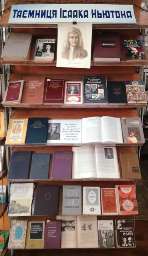|
|
 
12.01.2018__________
The Mystery of Isaac Newton
 January 4, 2018 marks the 375th birthday of the English mathematician, astronomer and physicist Isaac Newton. The exhibition "The Mystery of Isaac Newton" presented in the department of scientific literature is devoted to this event. January 4, 2018 marks the 375th birthday of the English mathematician, astronomer and physicist Isaac Newton. The exhibition "The Mystery of Isaac Newton" presented in the department of scientific literature is devoted to this event.
Sir Isaak Newton is an English scientist, a founder of modern natural science, a creator of classical physics and one of the founders of calculus of the infinitesimals. He was born on January 4, 1643 in the village of Woolsthorpe, Lincolnshire, UK in the year of Galileo's death. In the book "Mathematical Principles of Natural Philosophy" Newton formulated the laws of motion, known as Newton's laws and the law of universal gravitation, which became the basis of scientific world outlook for the next three centuries and had a great influence not only on physics, but also on philosophy. Using his theory, Newton was able to explain Kepler's laws describing the motion of planets around the Sun, thus eliminating the last doubts about the heliocentric system of the universe. Newton built the first telescope-reflector and developed theory of colour based on the observation that a prism decomposes white light into the colours of the visible spectrum.
He formulated the empirical law of heat exchange and the sound speed theory. In mathematics Newton together with Leibnitz developed calculus of infinitesimals, worked with series and proposed Newton's method for solving nonlinear equations. Newton dedicated a lot of time to alchemy and biblical chronology, although most of his works in these areas remained unpublished during his lifetime. Newton graduated from Cambridge University and worked there as a mathematics professor.
He was a president of the Royal Scientific Society and a member of parliament. He served the government of the Kingdom of England as a caretaker, and from 1699 he was a director of the Royal Mint. Contemporaries highly appreciated Newton's achievements. In 1705 he was awarded the title of nobleman. In the last years, being on the top of wealth and fame, Newton became more sociable. It seemed that he wanted to benefit everyone who needed his help, he never refused to support anyone. They said about Isaac Newton: "The one who surpassed the human race in intellect ". And hundreds of years later it is difficult to imagine a civilization without Newton's outstanding discoveries.
|
 








|







